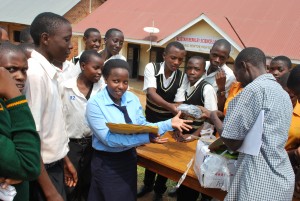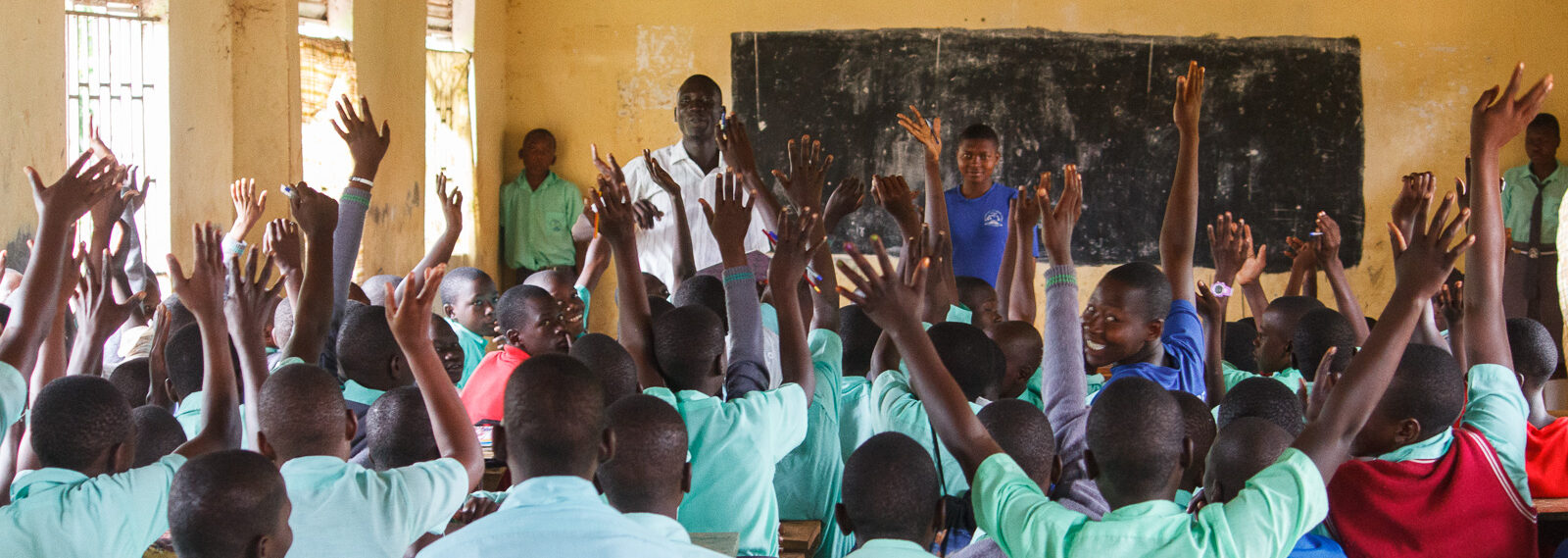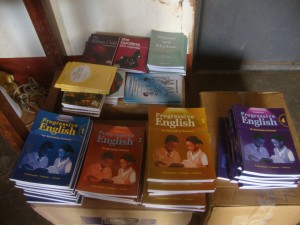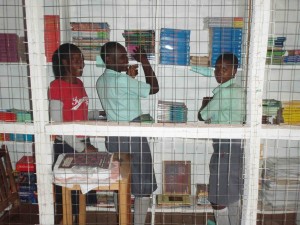The Humanist Schools in Uganda have received substantial support from two U.S. Humanist organisations.
KidsHeartKids, a charity established by Mario Mouton, his wife and their 7 year old daughter Lylah, set out in November to raise money for the Humanist Schools. They created a website, a FaceBook page and initiated a number of very successful fundraising activities. The following message from Mario sets out the extent of the support they have been able to send to the schools.
 “We have raised enough to Sponsor two students for four years at Isaac Newton School, Masaka. We have also collected around $500 in quality drawing pencils, charcoals, pastels, and watercolor pencils for the school. (The photograph shows the staff and students opening up the box of art materials.)
“We have raised enough to Sponsor two students for four years at Isaac Newton School, Masaka. We have also collected around $500 in quality drawing pencils, charcoals, pastels, and watercolor pencils for the school. (The photograph shows the staff and students opening up the box of art materials.)
We were also able to help Kasese Humanist Primary School as well. We shipped two electric school bells, established a penpal program, and were able to ship several hundred dollars in arts and crafts supplies and educational software.
We look forward to doing more in 2014 and consider this year to be successful as we started collections on top of Lylah’s savings late in the year.
Thank You
Mario Mouton-KidsHeartKids”
Ethical Society of St Louis has also raised a substantial amount of money for Isaac Newton High School and Mustard Seed School. This follows a visit to Uganda last year by Ed Schmidt and a colleague, who met with Peter Kisirinya and Steve and Hilary Hurd and squeezed a visit to Isaac Newton High School into a very busy schedule. Ed and Ethical Society leader Kate Lovelady have been very successful in mobilising individual members of his organisation to support the scholarship scheme for students at the schools. Here is the latest message from Ed:
“Ethical Society of St Louis is to sponsor 7 girls for 4 years at full board. We have 5 donations of $480, with commitments from four of those “giving units” (a single person, two couples, and two couples together) to continue each year for 4 years. Not sure whether the 4th donor couple is committed for 3 more years, but if not we will cover. In addition we have collected about $2000 in smaller donations. As I mentioned earlier, we are thinking of this as the first two years for two girls, and we will ask for more donations as this amount runs out.
We’d like the scholarships all to go to girls starting in Senior 1. The distribution to be 5 to Isaac Newton and the two remaining scholarships to go to Mustard Seed School.
Cheers
Ed”
The schools are in the process of recruiting their new intake of students. As soon as we receive information, my wife, Hilary, who takes care of our scholarship programme will send details of the students and their photographs to the new sponsors. These two initiatives are a real boost to confidence in the Humanist Schools in Uganda. Given the difficult political conditions in Uganda, the schools particularly welcome this show of support from friends around the world at the present time.

Posted: March 6, 2014 by Steve Hurd
Books raise standards
Our first priority at the beginning of each year is to increase the stock of books in the Humanist schools.
In February UHST allocated £2,800 to the accounts of the schools at Aristoc bookshop in Kampala. The two Isaac Newton Schools and Mustard Seed Secondary School were each allocated £800 and Kasese Humanist Primary School £400.
The photograph shows some of the new books chosen by Isaac Newton School, Masaka. The libraries at Issac Newton School, Mpigi and Mustard Seed School have been similarly augmented.
In a recent email Moses Kamya, the Director of Mustard Seed School, wrote: “Yesterday we selected and transported text books from Aristoc bookshop in Kampala. Students were delighted to receive them. This will allow them to support their lessons with reading with the expectation of better grades. One student named Nicholas Tamuzade of S3 commented in response to receiving the text books that, “I can now be 100% sure of making a first grade come next year with these new text books, congratulations master“. We are making all efforts to enable the children to love reading on their own to supplement teachers’ notes. Attached is a picture of the librarian, m/s Jamira working with students to place the books in the newly refurbished book shelves in the library.” Encouraging students to become independent learners is an important objective of the Humanist schools. Book rich learning empowers students to think for themselves and to show respect for evidence.
transported text books from Aristoc bookshop in Kampala. Students were delighted to receive them. This will allow them to support their lessons with reading with the expectation of better grades. One student named Nicholas Tamuzade of S3 commented in response to receiving the text books that, “I can now be 100% sure of making a first grade come next year with these new text books, congratulations master“. We are making all efforts to enable the children to love reading on their own to supplement teachers’ notes. Attached is a picture of the librarian, m/s Jamira working with students to place the books in the newly refurbished book shelves in the library.” Encouraging students to become independent learners is an important objective of the Humanist schools. Book rich learning empowers students to think for themselves and to show respect for evidence.
Posted: March 4, 2014 by Steve Hurd
American support for the Humanist Schools
The Humanist Schools in Uganda have received substantial support from two U.S. Humanist organisations.
KidsHeartKids, a charity established by Mario Mouton, his wife and their 7 year old daughter Lylah, set out in November to raise money for the Humanist Schools. They created a website, a FaceBook page and initiated a number of very successful fundraising activities. The following message from Mario sets out the extent of the support they have been able to send to the schools.
We were also able to help Kasese Humanist Primary School as well. We shipped two electric school bells, established a penpal program, and were able to ship several hundred dollars in arts and crafts supplies and educational software.
We look forward to doing more in 2014 and consider this year to be successful as we started collections on top of Lylah’s savings late in the year.
Thank You
Mario Mouton-KidsHeartKids”
Ethical Society of St Louis has also raised a substantial amount of money for Isaac Newton High School and Mustard Seed School. This follows a visit to Uganda last year by Ed Schmidt and a colleague, who met with Peter Kisirinya and Steve and Hilary Hurd and squeezed a visit to Isaac Newton High School into a very busy schedule. Ed and Ethical Society leader Kate Lovelady have been very successful in mobilising individual members of his organisation to support the scholarship scheme for students at the schools. Here is the latest message from Ed:
“Ethical Society of St Louis is to sponsor 7 girls for 4 years at full board. We have 5 donations of $480, with commitments from four of those “giving units” (a single person, two couples, and two couples together) to continue each year for 4 years. Not sure whether the 4th donor couple is committed for 3 more years, but if not we will cover. In addition we have collected about $2000 in smaller donations. As I mentioned earlier, we are thinking of this as the first two years for two girls, and we will ask for more donations as this amount runs out.
We’d like the scholarships all to go to girls starting in Senior 1. The distribution to be 5 to Isaac Newton and the two remaining scholarships to go to Mustard Seed School.
Cheers
Ed”
The schools are in the process of recruiting their new intake of students. As soon as we receive information, my wife, Hilary, who takes care of our scholarship programme will send details of the students and their photographs to the new sponsors. These two initiatives are a real boost to confidence in the Humanist Schools in Uganda. Given the difficult political conditions in Uganda, the schools particularly welcome this show of support from friends around the world at the present time.
Posted: February 27, 2014 by Steve Hurd
School honours sponsors
Isaac Newton High School, Masaka has named two buildings in honour of school sponsors.
The building has transformed the lives of the girls living there. It houses 76 girls in small family rooms with 6 girls sharing and has adjoining toilet and wash room facilities. The facility provides a safe home environment for a number of single and double orphan girls and should greatly improve their prospects of completing their schooling. Boarding opportunities are widely sought in both state and private schools in Uganda. Families feel that, if their children can get into boarding, they will be safer than would be the case if they were walking long distances to school. They will also be well fed, have access to health care and facilities for study in the evenings and at weekends. The school is confident that the new hostel will improve the educational attainment of girls at Isaac Newton School, and hopes that it will provide a fitting and lasting memorial to Lily van Haelen.